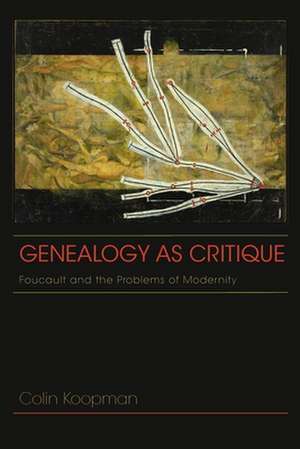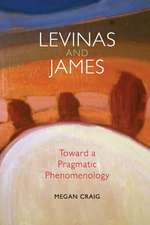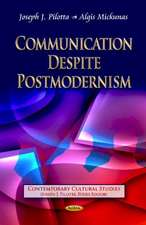Genealogy as Critique – Foucault and the Problems of Modernity: American Philosophy
Autor Colin Koopmanen Limba Engleză Paperback – 11 feb 2013
Din seria American Philosophy
-
 Preț: 200.80 lei
Preț: 200.80 lei -
 Preț: 152.72 lei
Preț: 152.72 lei -
 Preț: 126.81 lei
Preț: 126.81 lei -
 Preț: 158.55 lei
Preț: 158.55 lei -
 Preț: 144.38 lei
Preț: 144.38 lei -
 Preț: 174.08 lei
Preț: 174.08 lei -
 Preț: 315.85 lei
Preț: 315.85 lei - 19%
 Preț: 504.96 lei
Preț: 504.96 lei -
 Preț: 290.69 lei
Preț: 290.69 lei -
 Preț: 220.61 lei
Preț: 220.61 lei - 19%
 Preț: 503.56 lei
Preț: 503.56 lei -
 Preț: 291.28 lei
Preț: 291.28 lei - 19%
 Preț: 561.30 lei
Preț: 561.30 lei - 19%
 Preț: 592.33 lei
Preț: 592.33 lei - 19%
 Preț: 502.32 lei
Preț: 502.32 lei -
 Preț: 524.79 lei
Preț: 524.79 lei -
 Preț: 286.65 lei
Preț: 286.65 lei - 19%
 Preț: 530.39 lei
Preț: 530.39 lei -
 Preț: 290.90 lei
Preț: 290.90 lei -
 Preț: 283.01 lei
Preț: 283.01 lei - 19%
 Preț: 507.16 lei
Preț: 507.16 lei - 19%
 Preț: 560.81 lei
Preț: 560.81 lei -
 Preț: 275.17 lei
Preț: 275.17 lei -
 Preț: 391.56 lei
Preț: 391.56 lei -
 Preț: 288.02 lei
Preț: 288.02 lei - 19%
 Preț: 554.34 lei
Preț: 554.34 lei - 19%
 Preț: 566.58 lei
Preț: 566.58 lei -
 Preț: 285.88 lei
Preț: 285.88 lei - 19%
 Preț: 553.58 lei
Preț: 553.58 lei -
 Preț: 264.02 lei
Preț: 264.02 lei - 19%
 Preț: 565.49 lei
Preț: 565.49 lei -
 Preț: 256.89 lei
Preț: 256.89 lei -
 Preț: 489.07 lei
Preț: 489.07 lei - 19%
 Preț: 634.26 lei
Preț: 634.26 lei -
 Preț: 274.51 lei
Preț: 274.51 lei -
 Preț: 259.22 lei
Preț: 259.22 lei -
 Preț: 249.62 lei
Preț: 249.62 lei - 23%
 Preț: 665.08 lei
Preț: 665.08 lei
Preț: 242.54 lei
Nou
Puncte Express: 364
Preț estimativ în valută:
46.41€ • 48.46$ • 38.41£
46.41€ • 48.46$ • 38.41£
Carte tipărită la comandă
Livrare economică 04-18 aprilie
Preluare comenzi: 021 569.72.76
Specificații
ISBN-13: 9780253006219
ISBN-10: 025300621X
Pagini: 368
Ilustrații: black & white illustrations
Dimensiuni: 165 x 227 x 24 mm
Greutate: 0.5 kg
Editura: MH – Indiana University Press
Seria American Philosophy
ISBN-10: 025300621X
Pagini: 368
Ilustrații: black & white illustrations
Dimensiuni: 165 x 227 x 24 mm
Greutate: 0.5 kg
Editura: MH – Indiana University Press
Seria American Philosophy
Cuprins
Acknowledgments
Introduction: What Genealogy Does
1. Critical Historiography: Politics, Philosophy & Problematization
2. Three Uses of Genealogy: Subversion, Vindication & Problematization
3. What Problematization Is: Contingency, Complexity & Critique
4. What Problematization Does: Aims, Sources & Implications
5. Foucault's Problematization of Modernity: The Reciprocal Incompatibility of Discipline and Liberation
6. Foucault's Reconstruction of Modern Moralities: An Ethics of Self-Transformation
7. Problematization plus Reconstruction: Genealogy, Pragmatism & Critical Theory
Notes
Bibliography
Index
Recenzii
Colin Koopman rethinks Foucault's work from the ground up, re-reading his relationships to Kant, Nietzsche, Deleuze and Habermas. In so doing, he opens up fruitful new avenues for connecting Foucaultian genealogical critique to pragmatism and Habermasian critical theory. It is a must read for anyone interested in the relationship between Foucault and critical theory.--Amy R. Allen, Dartmouth College
Notă biografică
Descriere
Shows that philosophical genealogy involves not only the critique of modernity but also its transformation
















